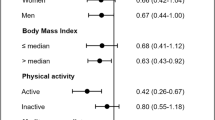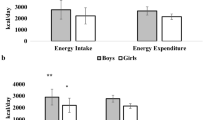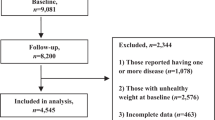Abstract
Objective: The purpose of this study was to analyze the association of food, nutrient and energy intakes with olive oil consumption in Spain.
Design: Cross-sectional study by face-to-face interview.
Setting: Population-based random sample derived from the Catalan Nutrition Survey.
Subjects: In total, 1600 individuals between 18 and 60 y of age.
Intervention: Two 24-h recalls were administered to measure food and nutrient intakes. Food consumption and nutrient intakes were analyzed comparing the highest and lowest quartiles of olive oil consumption.
Results: Those with the highest consumption of olive oil (greater than 13.5% of total calories, fourth quartile) consumed less cereal, baked goods, whole milk, sausages, candy, fruit juice and soft drinks, but more fish, eggs, vegetables and added fats, as compared to those with the lowest olive oil consumption (less than 6.8% of total calories, first quartile). The group with the greatest olive oil consumption also demonstrated high total fat intake, although saturated fats showed a lower percentage of total energy intake. Vitamin intake was more adequate in those with the highest consumption of olive oil.
Conclusion: Olive oil is a key contributor to the healthy aspects attributed to the Mediterranean diet, and as such, nutritional objectives in Mediterranean countries should address reducing saturated fats, without modifying quantities of olive oil.
Sponsorship: Catalan Department of Health.
This is a preview of subscription content, access via your institution
Access options
Subscribe to this journal
Receive 12 print issues and online access
$259.00 per year
only $21.58 per issue
Buy this article
- Purchase on Springer Link
- Instant access to full article PDF
Prices may be subject to local taxes which are calculated during checkout
Similar content being viewed by others
References
Beaton GH, Miller J, McGuire V, Feather TE & Little JA (1983): Sources of variance in 24-hour dietary recall data: implications for nutrition study design and interpretation. Carbohydrate sources, vitamins and minerals. Am. J. Clin. Nutr. 37, 986–995.
Feinberg M, Favier JC & Ireland-Ripert J (1991): Répertoire général des aliments. Paris: Tec & Doc Lavoisier.
Ferro-Luzzi A, James WPT & Kafatòs A (2002a): The high-fat Greek diet: a recipe for all? Eur. J. Clin. Nutr. 56, 796–809.
Ferro-Luzzi A, James WPT & Kafatos A (2002b): Response to the letter submitted by D Trichopoulos entitled ‘In defense of the Mediterranean diet’. Eur. J. Clin. Nutr. 2000; 56, 928–929, 930–931.
James WPT, Duthie GG & Wahle KWJ . (1989): The Mediterranean diet: protective or simply non-toxic?. Eur. J. Clin. Nutr. 43 Suppl 2, 31–42.
Keys A (1995): Mediterranean diet and public health: personal reflections. Am. J. Clin. Nutr. 61 (Suppl), 1321S–1323S.
Lada AT & Rudel LL (2003): Dietary monounsaturated versus polyunsaturated fatty acids: which is really better for protection from coronary heart disease? Curr. Opin. Lipidol. 14, 41–46.
Martínez-González MA, Varo JJ, Santos JL, De Irala J, Gibney M, Kearney J & Martínez JA (2001): Prevalence of physical activity during leisure time in the European Union. Med. Sci. Sports Exerc. 33, 1142–1146.
Nestle M (1995): Mediterranean diets: historical and research overview. Am. J. Clin. Nutr. 61 (Suppl), 1313S–1320S.
Rivellese AA, Maffettone A, Vessby B, Uusitupa M, Hermansen K, Berglund L, Louheranta A, Meyer BJ & Riccardi G (2003): Effects of dietary saturated, monounsaturated and n-3 fatty acids on fasting lipoproteins, LDL size and post-prandial lipid metabolism in healthy subjects. Atherosclerosis 167, 149–158.
Serra-Majem L & Aranceta J (2001): Nutritional objectives for the Spanish population. Consensus from the Spanish Society for Community Nutrition. Public Health Nutr. 4 (6A), 1409–1413.
Serra-Majem L, Ferro-Luzzi A, Bellizzi MC & Salleras L (1997): Nutrition policies in Mediterranean Europe. Nutr. Rev. 55 (Suppl II), S39–S54.
Serra-Majem L, Ribas L & Ramon JM (1999): Compliance with dietary guidelines in the Spanish population. Results from the Catalan Nutrition Survey. Br. J. Nutr. 81 (Suppl), S105–S112.
Trichopoulos D (2002): In defense of the Mediterranean Diet: a letter to the editor. Eur. J. Clin. Nutr. 56, 928–929.
Trichopoulou A, Gnardellis C, Benetou V, Lagiou A, Bamia C & Trichopoulos D (2002): Lipid, protein and carbohydrate intake in relation to body mass index. Eur. J. Clin. Nutr. 56, 37–43.
Visioli F, Bellosta S & Galli C (1998): Free radical-scavenging properties of olive oil poly phenols. Biochem. Biophys. Res. Commun. 247, 60–64.
Visioli F & Galli C (2001): The role of antioxidants in the Mediterranean diet. Lipids 36 (Suppl), S49–S52.
Willett WC, Sacks F, Trichopoulou A, Drescher G, Ferro-Luzzi A, Helsing E & Trichopoulos D (1995): Mediterranean diet pyramid: a cultural model for healthy eating. Am. J. Clin. Nutr. 61 (Suppl), 1402S–1406S.
World Health Organization (1998): Preparation and use of food-based dietary guidelines: report of a joint FAO/WHO consultation. Technical Report Series no 880. Geneva: WHO.
Author information
Authors and Affiliations
Contributions
Contributiors: Ll S-M Contributed to the study design, data analysis, paper preparation and writing. Data analysis and paper preparation was carried out by JN and LR, and JA T Contributed to paper preparation and discussion.
Corresponding author
Rights and permissions
About this article
Cite this article
Serra-Majem, L., Ngo de la Cruz, J., Ribas, L. et al. Olive oil and the Mediterranean diet: beyond the rhetoric. Eur J Clin Nutr 57 (Suppl 1), S2–S7 (2003). https://doi.org/10.1038/sj.ejcn.1601801
Published:
Issue Date:
DOI: https://doi.org/10.1038/sj.ejcn.1601801
Keywords
This article is cited by
-
Consumption of extra virgin olive oil improves body composition and blood pressure in women with excess body fat: a randomized, double-blinded, placebo-controlled clinical trial
European Journal of Nutrition (2018)
-
Neurobehavioral deficits and brain oxidative stress induced by chronic low dose exposure of persistent organic pollutants mixture in adult female rat
Environmental Science and Pollution Research (2016)
-
Olive oil has a beneficial effect on impaired glucose regulation and other cardiometabolic risk factors. Di@bet.es study
European Journal of Clinical Nutrition (2013)
-
Iron deposits and dietary patterns in familial combined hyperlipidemia and familial hypertriglyceridemia
Journal of Physiology and Biochemistry (2010)
-
Incidence of obesity is lower in persons who consume olive oil
European Journal of Clinical Nutrition (2009)



